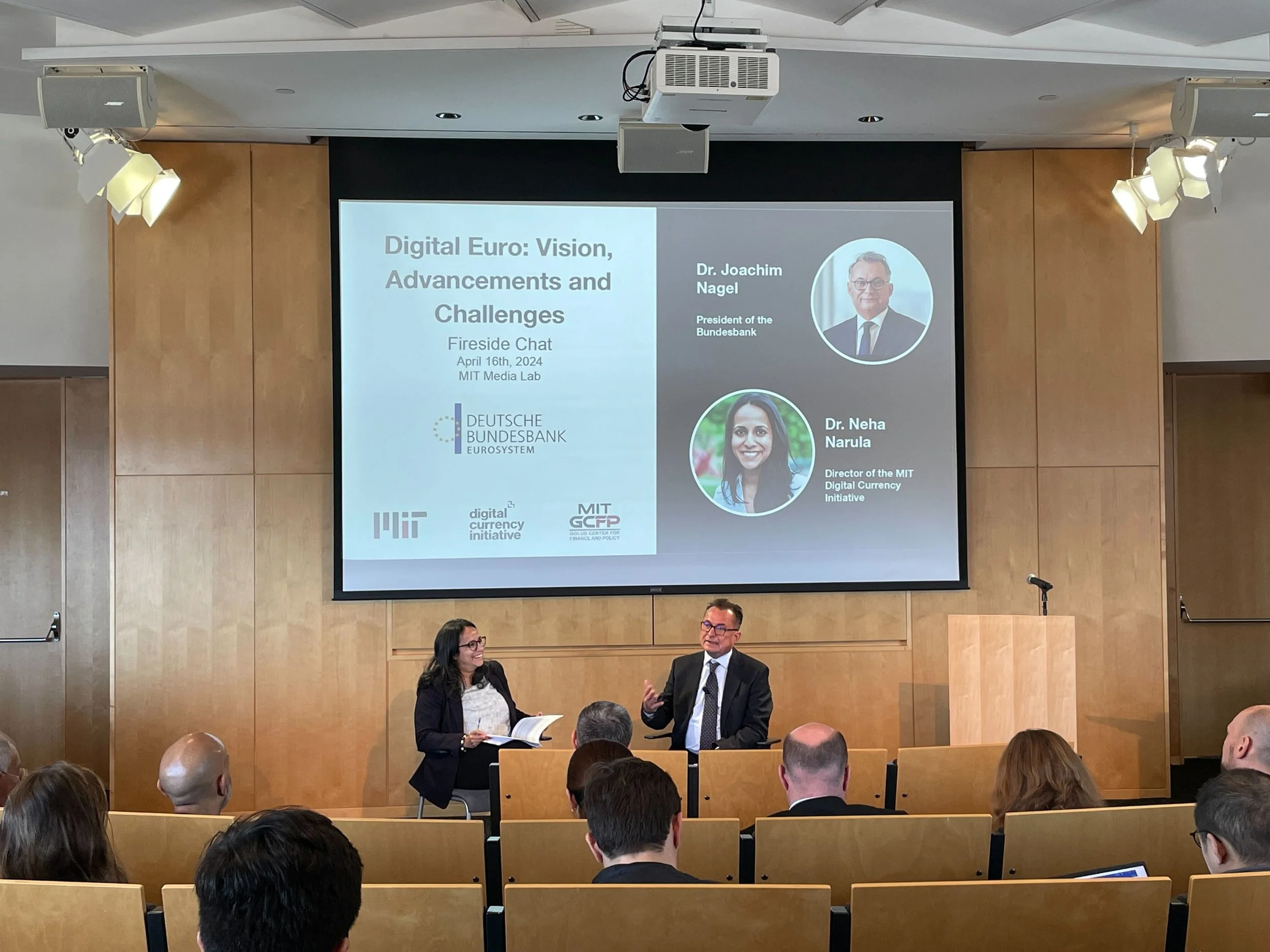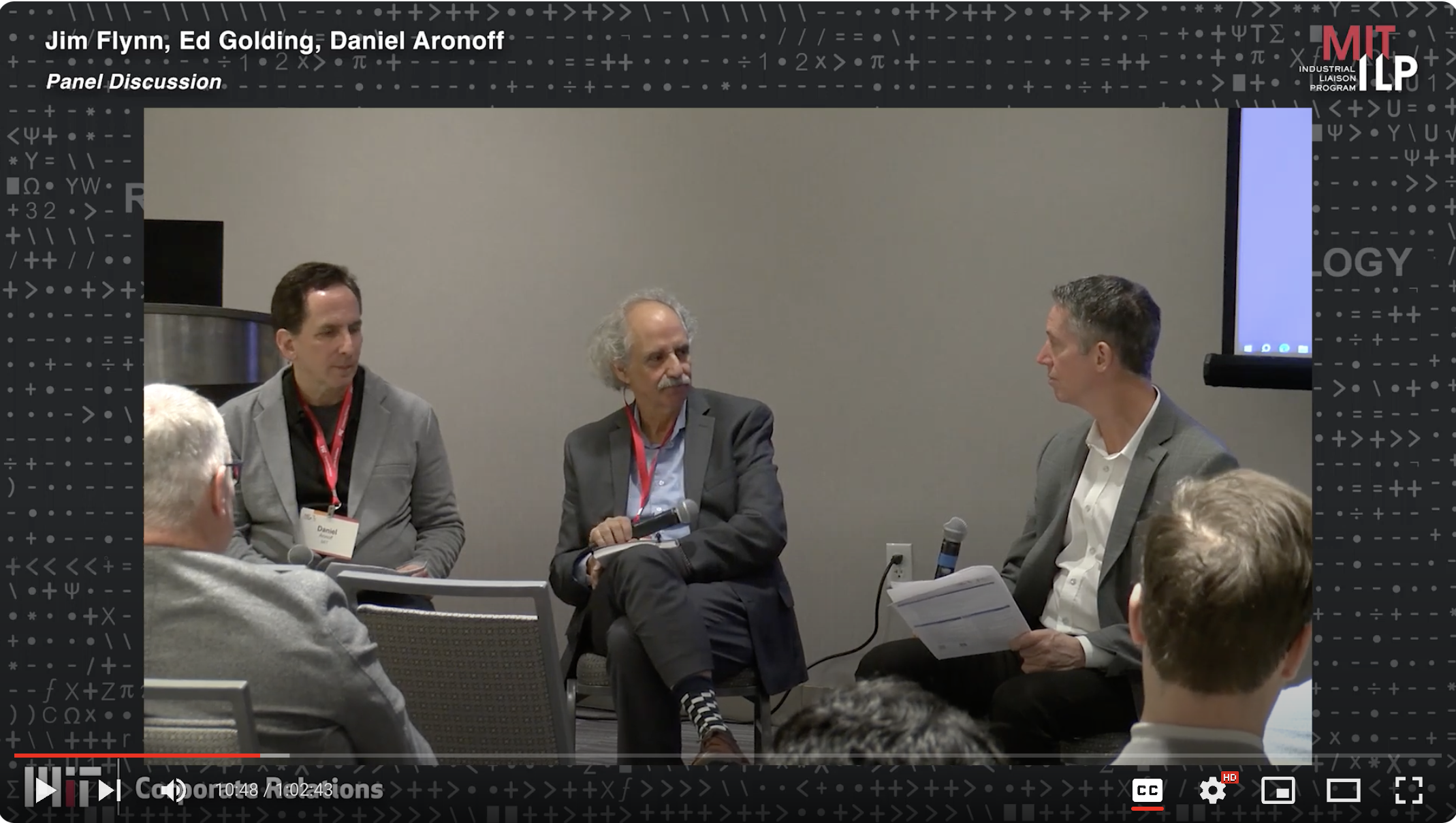Neha Narula, Director of the MIT Digital Currency Initiative (DCI), has been selected for the Rockefeller Foundation's 2025 Bellagio Center Residency.
Read MoreAs innovation in electronic payments accelerates, privacy considerations are becoming ever more important. While the generation and use of data is an intrinsic part of electronic payments and can benefit consumers and businesses, it may also present privacy concerns, particularly if there are not sufficient safeguards.
To study how emerging technology might safeguard consumers’ private information when making payments with a central bank digital currency, we conducted research with staff from the Bank of England over the past year. Our findings, published today, identify options for “Enhancing the Privacy of a Digital Pound.”
Read MoreWhy does innovation in financial services matter to everyone, and how can the public sector support its advancement? On Thursday, September 26, MIT’s Digital Currency Initiative was privileged to host a visit and fireside chat at the Media Lab on these questions and on the future of money with Dr. Agustín Carstens, General Manager of the Bank for International Settlements in Basel, Switzerland.
Read MoreMadars Virza SM '14, PhD '17, a Research Scientist at the MIT Media Lab's Digital Currency Initiative (DCI), is the recipient of an IEEE Symposium on Security and Privacy Test of Time Award for “Zerocash: Decentralized Anonymous Payments from Bitcoin,” a paper he co-authored in 2014.
Read MoreOn April 16, Dr. Joachim Nagel, President of the Deutsche Bundesbank, the central bank of Germany, visited the MIT Media Lab. There, he announced this new collaboration between the Bundesbank and the DCI for central bank digital currency design research.
Read MoreIn November, MIT Digital Currency Initiative research scientist Daniel Aronoff participated in a panel discussion along with Ed Golding, Executive Director of the MIT Golub Center for Finance, on fintech and the digitization of finance at the MIT Research and Development Conference. The lively conversation touched on many topics relevant to DCI’s work, including safeguarding privacy in central bank digital currencies, decentralizing repo markets through smart contracts, and the future of cash.
Read MoreMIT DCI research scientist Daniel Aronoff shared his work on US Treasury repo markets on two occasions this fall. He spoke on the “Repo on chain and collateral mobilization” panel at the 2023 Rates & Repo North America, and participated in the NBER Market Design Working Group Meeting. You can find information about his ongoing research on this topic here, and watch a video of the panel below.
Read MoreIn October, former central banker Chris Calabia of MIT’s Digital Currency Initiative (MIT DCI) gave a talk at The Institute of International & European Affairs titled “Towards a Central Bank Digital Currency? One View from the United States.”
In this, the second of the IIEA’s mini-series of webinars on the subject of central bank digital currencies (CBDCs), Chris Calabia, Head of CBDC Programs at the Massachusetts Institute of Technology (MIT) Digital Currency Initiative, shares recent research on the opportunities and challenges presented by the potential introduction of a CBDC like a ‘digital dollar’. Mr. Calabia addresses practical and policy questions that this digital asset could raise for our economies and societies, including whether CBDCs could promote greater financial inclusion and how to safeguard privacy while mitigating other risks like fraud and money laundering.
Read MoreThis week MIT’s Digital Currency Initiative (MIT DCI) released the source code of research into smart contracts for central bank digital currency (CBDC) – PArSEC (Parallelized Architecture for Scalably Executing smart Contracts). Given the solution is designed for central banks, it is a centralized offering and sidesteps using blockchain, although it supports Ethereum smart contracts.
The work is part of Project Hamilton, an initiative in conjunction with the Boston Federal Reserve and the source code is released under the umbrella of openCBDC.
It claims to have sufficient scale for most potential central bank applications, although it is very much a research project rather than pilot or production ready.
Read MoreThe Massachusetts Institute of Technology (MIT) Digital Currency Initiative (DCI) has introduced the experimental PArSEC platform. PArSEC — short for "parallelized architecture for scalably executing smart contracts" — is open source and developed with central bank digital currency (CBDC) in mind.
The developers highlighted the platform’s speed. It performed 118,000 ERC-20 transactions per second on 128 hosts — exceeding public permissionless blockchains, they said. The platform was thus capable of handling cross-border contracting and could be used to innovate supply chains and compliance checks as well.
Read More[The] sudden implosion of the popular cryptocurrency exchange FTX has intensified a political war for the soul of crypto that was already raging.
In the coming year, we are likely to see that fight come to a head in US courtrooms and in Congress. The future of finance hangs in the balance. […]
Although crypto enthusiasts may now be inclined to distance themselves from FTX, the episode reflects “the crypto we created,” says Neha Narula, director of the Digital Currency Initiative at MIT.
To begin with, she says, the industry is over-reliant on centralized exchanges like FTX. But it’s not just the centralization. “It’s also this token casino economy,” says Narula.
Read MoreDCI senior advisor Chris Calabia was interviewed on his experience as a regulator, his advice for innovation, and more. Chris worked for over twenty years at the Federal Reserve Bank of New York. Through that role and others, including as a Senior Advisor on regulatory policy at the Bill & Melinda Gates Foundation, Chris has worked closely with regulators from all of the world, providing him a unique perspective not only into the mindset of US regulators, but regulators in many different socioeconomic contexts.
Read MoreDCI researcher Reuben Youngblom gave a talk on blockchain ethics at ETHDenver. As blockchain becomes more impactful in the world, our obligation to make sure that we are proceeding in a responsible manner increases. But what does a responsible future look like?
The featured image on this post is by Timothy Actwell and used via a Creative Commons license.
Read MoreJames Lovejoy, of the Federal Reserve Bank of Boston, presented "Hamilton: A High-Performance Transaction Processor for Central Bank Digital Currencies" at NSDI '23. This paper was co-authored by Madars Virza, Cory Fields, and Neha Narula of the DCI and James Lovejoy, Kevin Karwaski, and Anders Brownworth of the FRBB, and it proposes the Hamilton transaction processor, one of the primary results of this collaboration.
The featured image on this post is by Thomas Hawk, and used under a Creative Commons license.
Read MoreOn April 27, DCI director Neha Narula spoke at Consensus 2023 on private and public money and the role of blockchain technology in future digital payment systems.
Read MoreOn April 22-23, the MIT Bitcoin Club hosted the 10th MIT Bitcoin Expo. DCI director Neha Narula gave a keynote speech, Cryptoeconomic Systems managing editor Reuben Youngblom presented a talk titled "The 70 Megaton Gorilla: Addressing the PoW climate narrative," and DCI software engineer Sam Stuewe presented an asynchronous talk titled "Are We CBDC Yet? A Healthy Dose of Skepticism." Sam also mentored participants in the Expo's Hackathon.
Read MoreOn Tuesday, January 17th at the World Economic Forum in Davos, Switzerland, Axios markets reporter Courtenay Brown and MIT Media Lab Digital Currency Initiative director Neha Narula considered the most pressing issues facing cryptocurrency today including how (and if) the industry should be regulated, how governments and financial institutions should interact with the sector, and how investments could be safeguarded. The View from the Top sponsored segment featured Ripple chief executive officer Brad Garlinghouse.
Read MorePotential designs may involve intermediaries in new and different ways
Central bank digital currencies potentially offer, in a digital form, the advantages of central bank money: settlement finality, liquidity and integrity. However, both offline and online commerce are susceptible to fraud and other kinds of disagreements. The existing techniques for managing fraud and disputes focus on giving users easy access to chargebacks, which relies on intermediaries to resolve disputes. Potential designs for CBDC may involve intermediaries in new and different ways, or may not use intermediaries at all, calling into question how to address fraud if CBDCs become widely used.
Read MoreOn this episode of “Money Reimagined,” Michael Casey, solo in Davos, Switzerland, on the sidelines of the World Economic Forum, speaks with Neha Narula, the director of the MIT Digital Currency Initiative to discuss the trends of both digitalization and innovation pertaining to stablecoins, digital currencies and the future of public money,
Read MoreOn Tuesday, January 17th at the World Economic Forum in Davos, Switzerland, Axios markets reporter Courtenay Brown and MIT Media Lab Digital Currency Initiative director Neha Narula considered the most pressing issues facing cryptocurrency today including how (and if) the industry should be regulated, how governments and financial institutions should interact with the sector, and how investments could be safeguarded. The View from the Top sponsored segment featured Ripple chief executive officer Brad Garlinghouse.
Read More

















